
17 minute read
Breaking
MAKING MOVES
Almost half a century after breaking burst onto the streets of the Bronx, meet the UK B-Boys and B-Girls helping reinvent, reinvigorate and reimagine their scene for a new era
Words RUTH McLEOD and TRACY KAWALIK Photography GAVIN BOND
B-Girl Vanessa
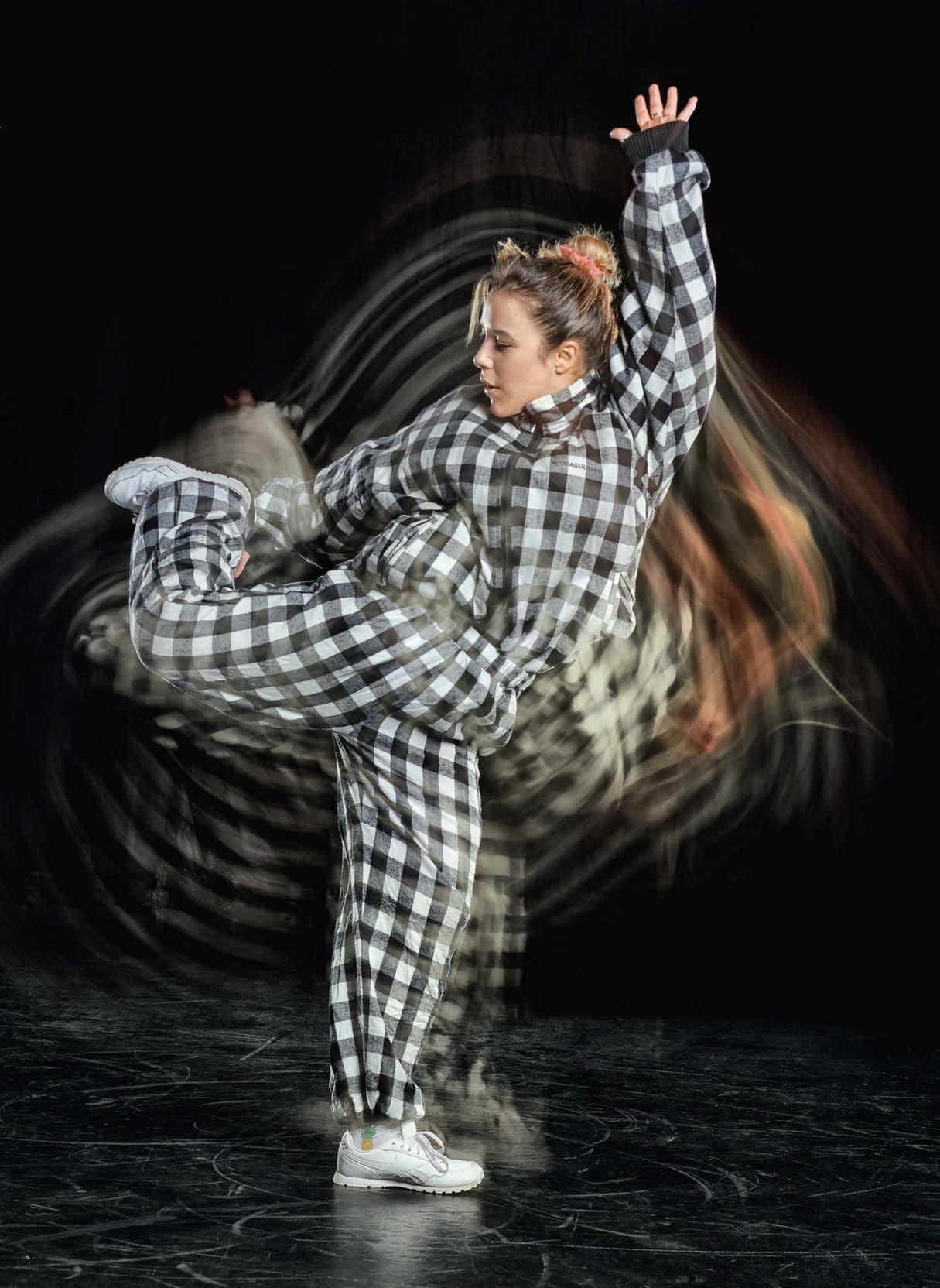
The 29-year-old Portuguese-born breaker won the 2019 Red Bull BC One Cypher UK final with a victory over Leeds’ RaWGina. As well as competing, she’s committed to teaching and promoting up-and-coming B-Girls
he world of competitive T – controversial for some – inclusion in the 2024 breaking usually involves spot-lit, sweat-drenched Paris Olympics. An unlikely alliance of objectors battles in packed-out venues for hyped-up crowds. has arisen following news of breaking’s Games
But on a Sunday evening in early March, thanks debut, comprising both traditional sportspeople to lockdown, B-Girl Vanessa Marina is performing sceptical of its credentials, and old-school breaking to the world via her mobile phone, in a small hired purists afraid that mainstream exposure might studio in Hackney Wick, east London. dilute the culture. But, for a fresh generation of
The Portuguese-born 29-year-old is competing UK breakers keen to push the boundaries of their live against Argentina-based B-Girl Carito for a scene, it’s just the latest step in a journey that was place in the final in Texas, and, despite the unusually already well underway. These B-Boys and B-Girls subdued backdrop, her energy is characteristically are athletes, artists, activists and adventurers, high. Vanessa’s feet shift rhythmically and instinctively using their art form to express themselves to an as she moves fluidly between freezes, footwork and ever-expanding audience. spins to a salsa-infused hip-hop soundtrack, seemingly “It’s great to have new platforms and propelled as much by her self-confidence as by her opportunities,” says Vanessa, who, at 18, moved athletic ability, honed through hours of practice. from Lisbon to London to pursue a breaking career
“When we dance, it shows our personality,” she and has since helped to evolve the UK B-Girl scene. says. “It shows character. Someone shy can become “The breaking scene is now thriving in London and their true self. Breaking is a language everyone across the UK. Scenes have to evolve; nothing stands around the world can understand, and a battle is still. As these new opportunities are born, we must a conversation. The person who goes first asks a embrace them and what they can do for the culture question; the person who battles next gives the and our future. If we stand still, the scene will die” answer. No two movements will ever be the same.” Though it was born in the Bronx, where breaking
It’s this marriage of artistic interpretation and battles and cyphers – freestyle battles fought in gymnastic skill that makes breakdancing – or the centre of a circle of B-Boys and B-Girls – were breaking, as it’s known in the scene – a unique used for everything from self-expression to settling proposition. Part art, part sport, breaking was scores and unifying neighbourhoods, breaking conceived on the streets of New York in the 1970s, has decades-old roots in the UK, too. Over the but has since spread around the world. More course of UK breaking history, London has been recently, its growing popularity has resulted in its home to prestigious battles such as the UK B-Boy
AJ the Cypher Cat
Breaking is in the blood of this 19-yearold – his father and uncles were part of the scene back in the ’80s. AJ – real name Aijion Brown – reached last year’s BC One Cypher UK semi-finals and now he has his eye on the chance to represent Team GB at the 2024 Paris Olympics
AJ the Cypher Cat
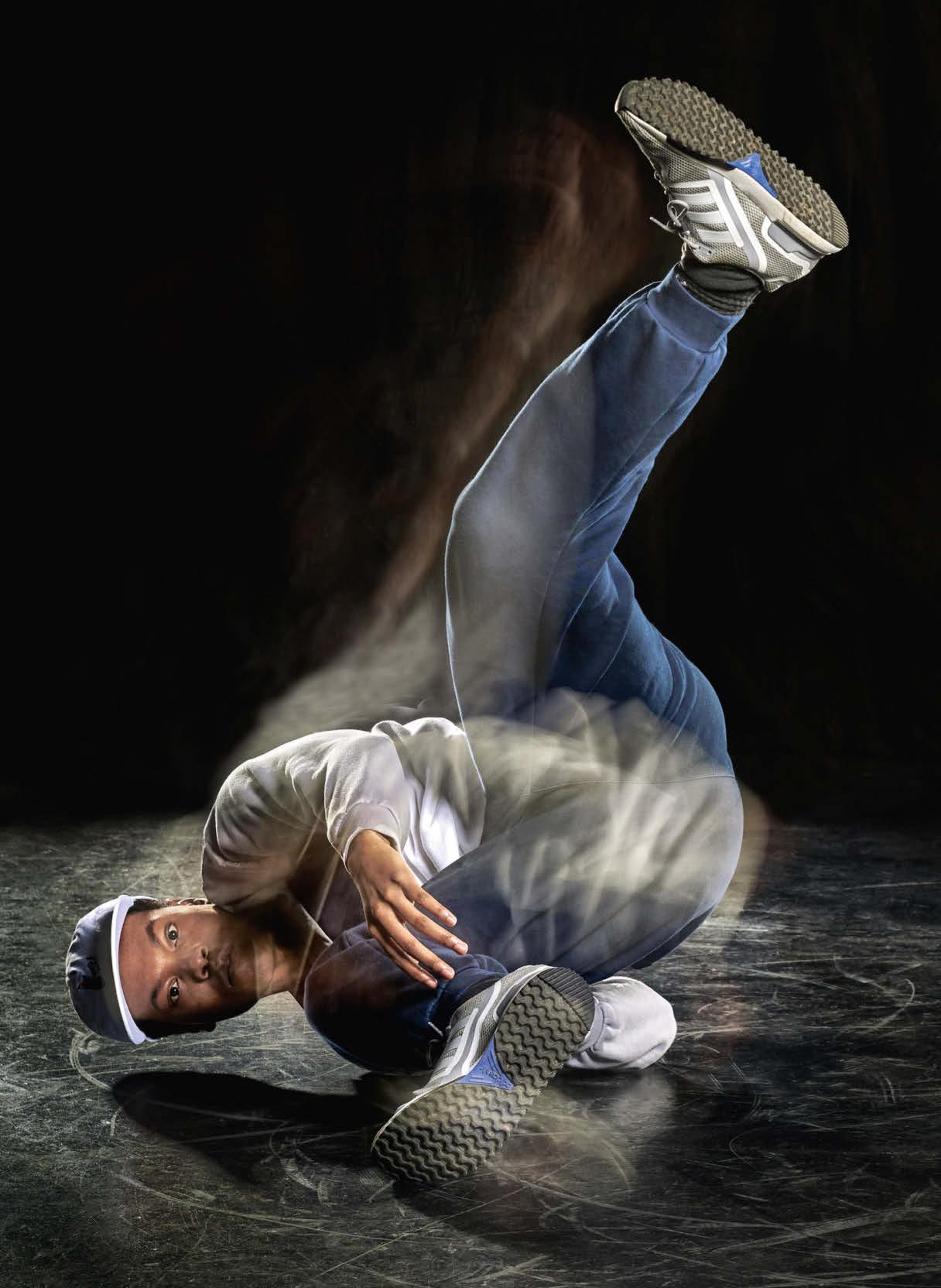
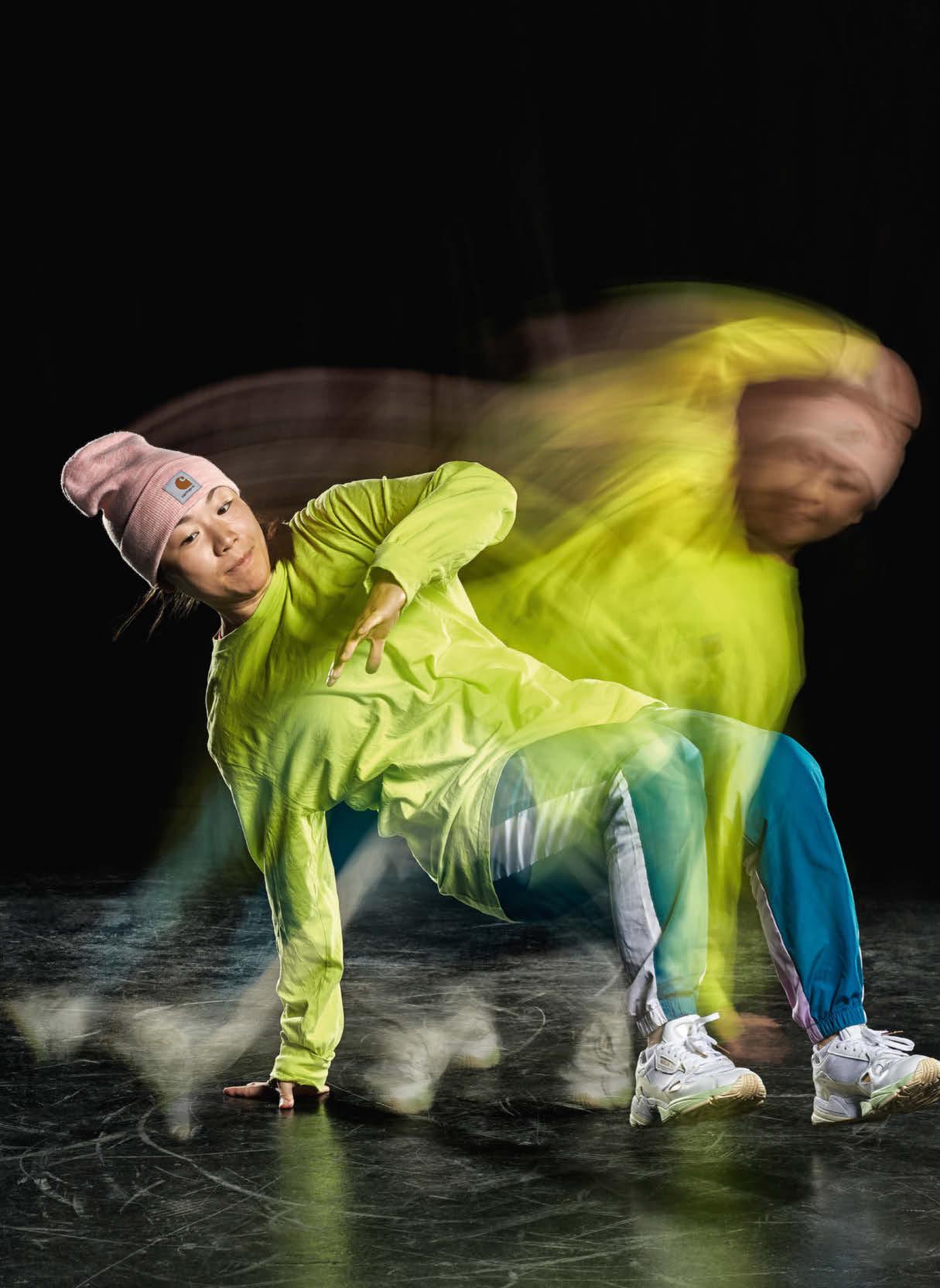
B-Girl Nat
Natasha Lee’s passion for breaking has taken her around the world, but her B-Girl career was almost cut short after she suffered a spinal injury. Thanks to sheer perseverance and dedicated training, however, the Hong Kong-born breaker has bounced back stronger than ever
B-Girl Nat
Championships, which not only made newspaper headlines and sold out Brixton Academy numerous times but helped keep the national scene alive. Small breaking hubs have long existed across the country, from Swindon to Aberdeen, and current Red Bull BC One Cypher UK champions RaWGina and Kid Karam are from Leeds and Derby respectively. In an internet age when it’s as easy for a B-Girl from Taunton to throw up her hardest moves online for the world to see as for a B-Boy in rural Kazakhstan, top breakers are not only indemand internationally for battles, performances and judging panels, but have the chance to pass on their skills to a new generation hungry to learn.
“The UK scene is still a bit chaotic; it’s going through a transitional phase right now,” says 25-year-old Bristol B-Boy and contemporary artist Izaak Brandt. “But it’s the least divided it ever has been. Some of the older generations in the UK have a fixed idea of what breaking should be – that it should be raw and people shouldn’t get on, that it should be extremely exclusive – but I think younger generations feel a longing to connect and get on with other members of their generation. And, thanks to the internet, there’s been more dialogue between them, which has created more unity. We’re starting to see people coming together.”
When dedicating yourself to a scene that demands practice time, often leads to injury and offers little financial reward, passion and resilience are key. Izaak got into B-Boying at the age of 11 after seeing Sunni Brummitt, also 11, perform at an event in Bristol. “I immediately wanted to get involved,” says Izaak. “Breaking lives within the realm of [both] sport and art. It’s a real intersection between both worlds and merges them perfectly, harmoniously. That appealed to me. Sunni has been one of my closest friends ever since.”
Izaak and Sunni perfectly embody each end of the spectrum of possibilities within breaking: Izaak’s wild artistic experimentation at one end and the fierce athleticism of Sunni – famed for his impossiblelooking headspins and explosive creativity in battle – at the other. With multiple world championship performances to his name, a contract as a Red Bull BC One All Star, and a reputation as one of the best B-Boys the UK has produced, Sunni is a poster boy for British breaking and has helped to put it back on the world map. “I had very few [UK breakers] to look up to,” says Sunni, who began breaking alongside climbing and playing football as a child in south-west England. “So, when I did my come-up, anything going good for me was a bonus. We’ve got a big underdog situation in the UK that we’ve kind of adopted and accepted and embraced. I might have got us some recognition, but we still have a long way to go.”
Breakers such as Sunni aren’t wary of their sport being professionalised in the push for progress on the global competitive stage. In common with many other elite breakers, the 26-year-old already trains like a top-tier gymnast – six hours per day, five days per week – and is quick to dismiss those reluctant to see breaking grow in mainstream popularity. “There are people who are 40 and used to be B-Boys and that’s what makes them cool and ‘hip hop’,” says Sunni, who’s in the process of moving back to Bristol after a stint living in Holland. “If they see B-Boys competing in tights on the telly, they’re not going to feel so cool. But that’s not the point of it; when they were those kids breaking on the street, if someone had said, ‘Do you want a dance studio, a nutritionist, a sports therapist?’, you know they’d all have said yeah. They were out there because of necessity, not a personal choice. People get that confused.”
But in this uniquely artistic sport, where there’s no universal regulation or regimentation, what may need to change in the shift towards the mainstream is how battles are judged. Currently, breakers attempt to wow crowds and win over judges with their own unique style, whether that’s about power moves (explosive manoeuvres such as headspins, flips and gravity-defying athletics) or top rock – upright footwork that requires a mixture of coordination, flexibility, rhythm, and out-of-this-world musicality. Winners and losers are decided by a panel of judges who weigh up elements from tricks to character and creativity to decide who becomes the champion – and right now there’s no template for this.
“This is why we’re right in the middle between an art form and a professional sport,” says Sunni, who before the pandemic would be battling, performing and judging in a different country every week, to the thunderous applause of fans in packed-out arenas. “It’s subjective. What you look for as a judge depends on the event and where you are. When I go to China, they teach breaking in dance schools where 500 pupils might be taught by one tutor and do the exact same rounds, with the same vocabulary, so you have to judge that in a certain way. Then you go to France and the scene seems to be split into either full-onstyle character cats or the no personality tricks and power breakers [one who focuses on power moves]. So it’s about being educated to know what to judge on, rather than having a standard set of criteria.”
For most breakers, competitions represent the quickest route to recognition. Presently, the pinnacle of battle success in the global breaking scene is
Izaak Brandt
A multidisciplinary artist as well as a breaker, Izaak has given up battling and instead represents and promotes the sport through various creative mediums. The 25-year-old hopes increased exposure will help make the breaking scene more inclusive and open-minded
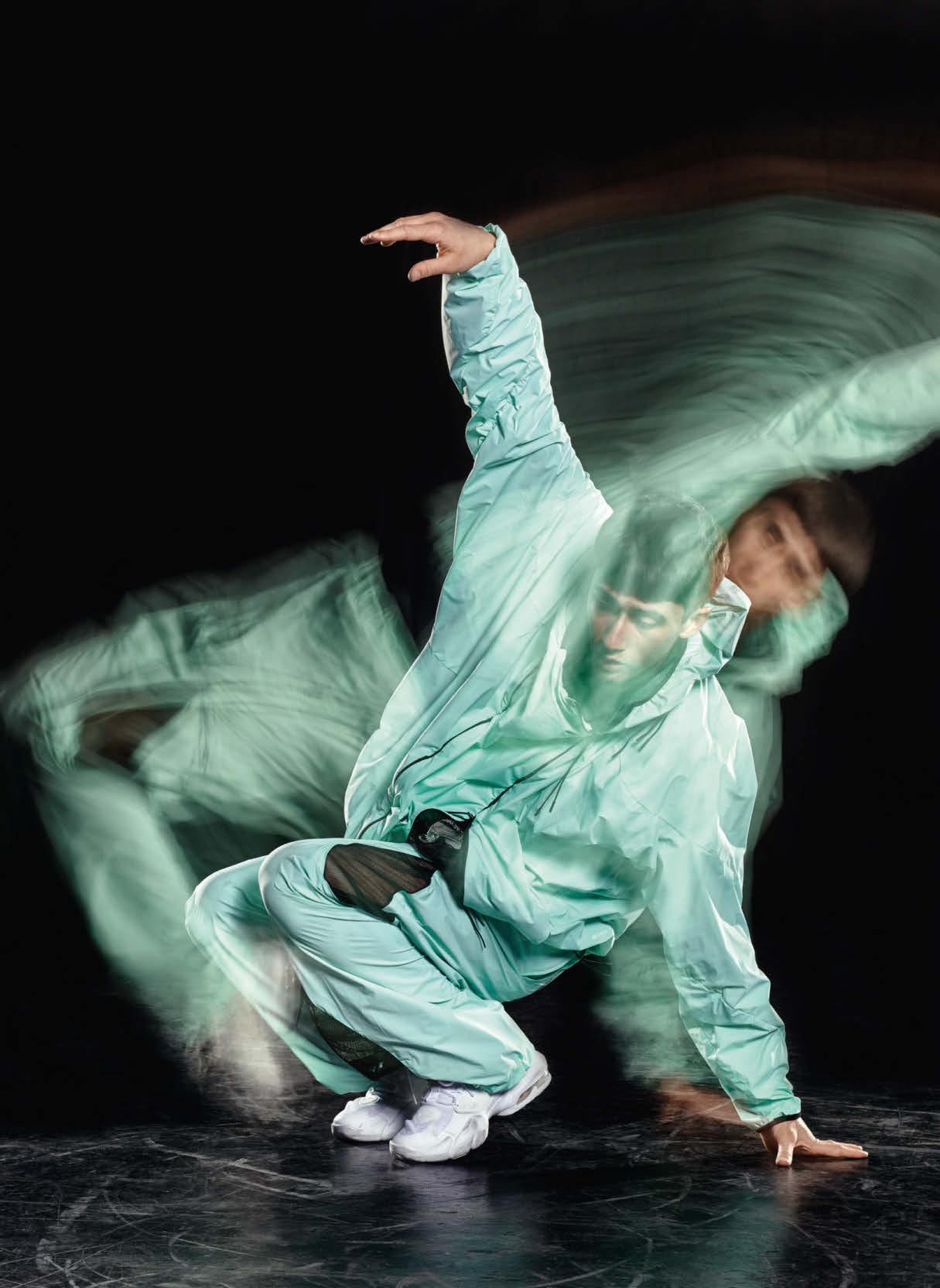
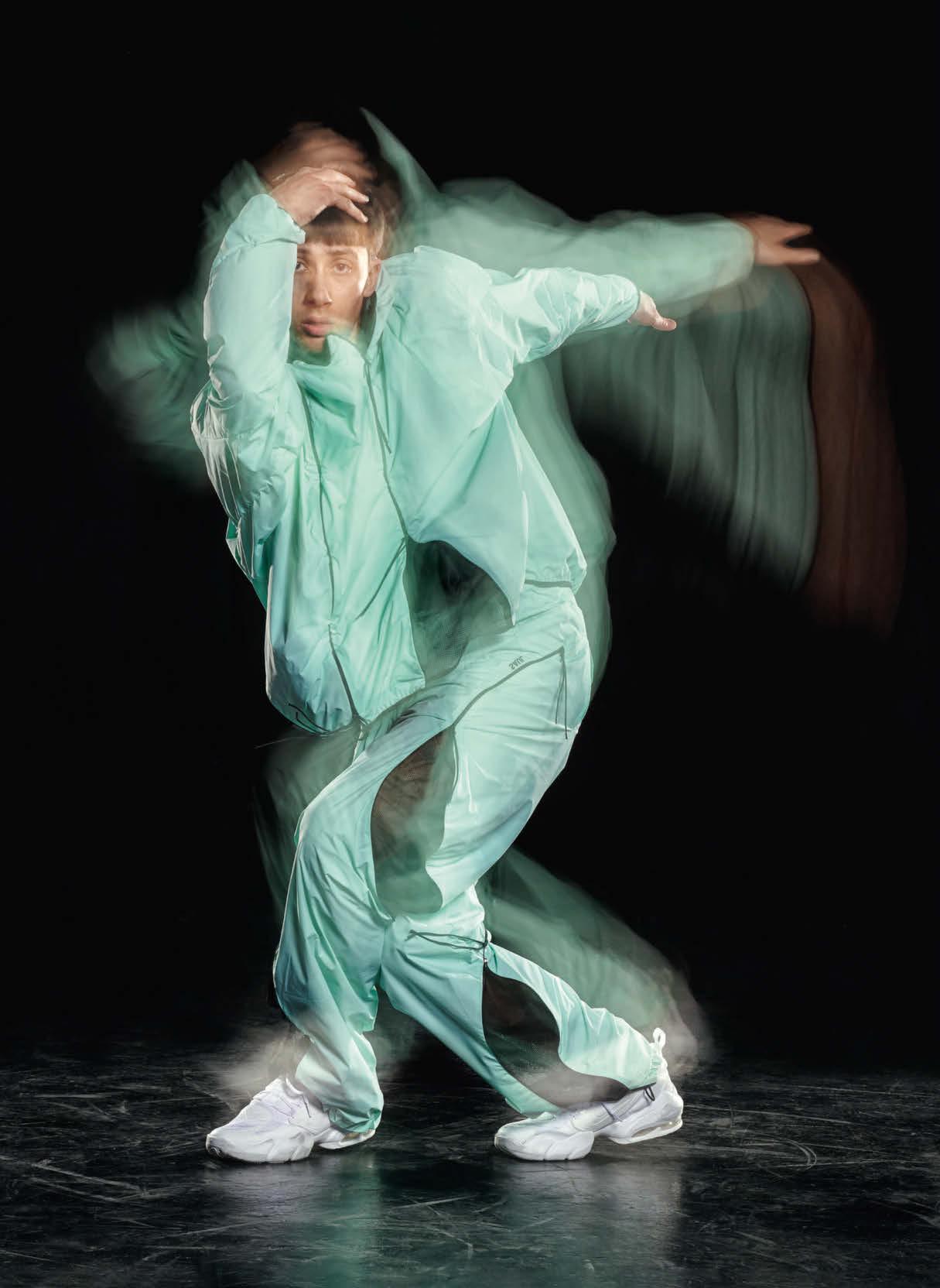
Izaak Brandt
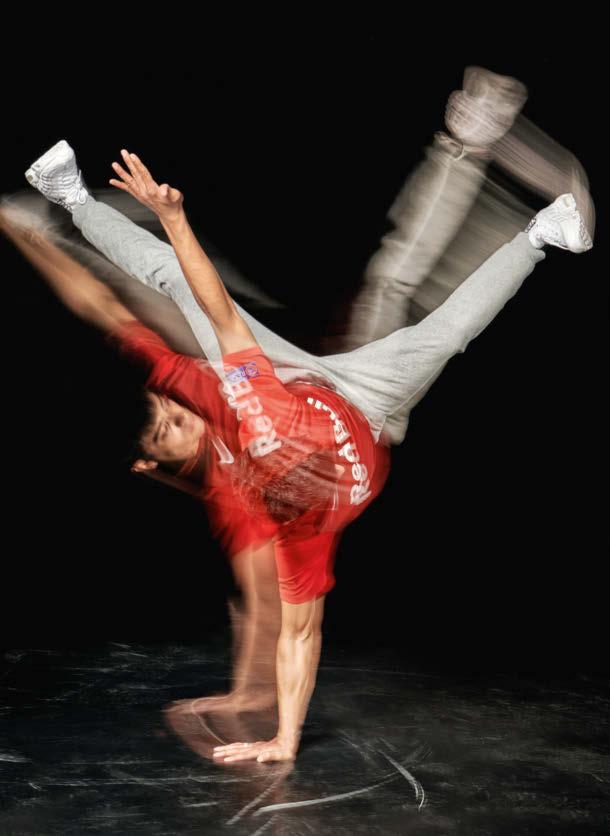
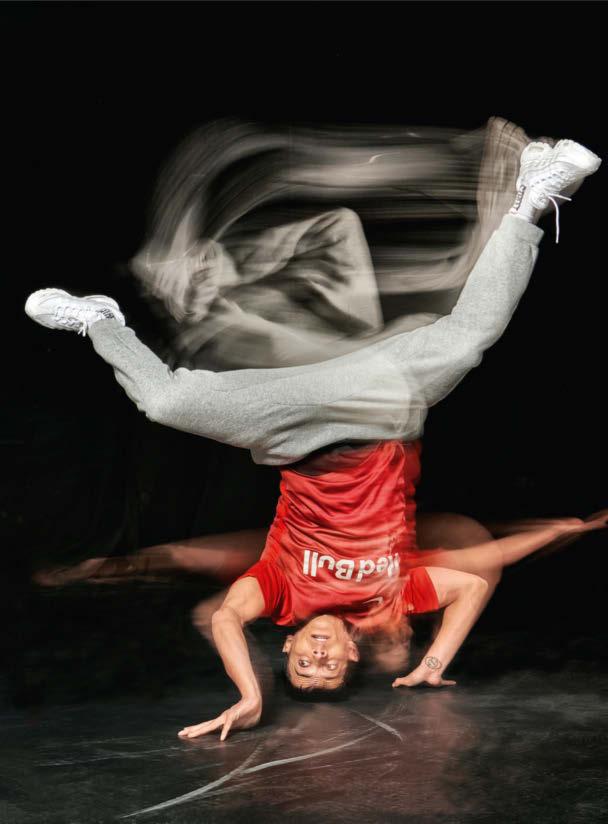
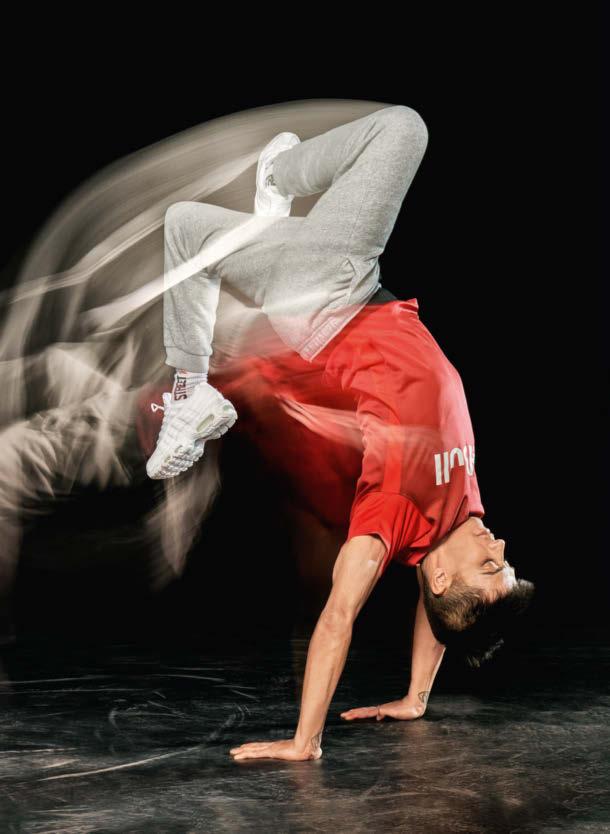
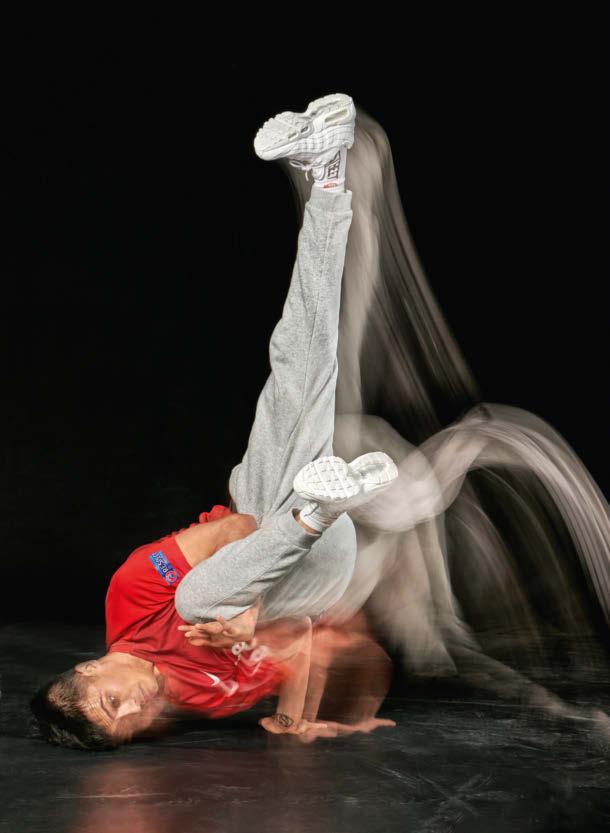
B-Boy Sunni
The poster boy of British breaking, Sunni Brummitt moved from Malaysia to the UK as a child and began breaking at the age of 10, joining his first crew, Toy Soldiers, soon after. In 2019, 14 years and many battle victories later, he became the first UK breaker to make the Red Bull BC One All Stars team
seminal international event Red Bull BC One, which began back in 2004. Annual national qualifiers feed through to the highly anticipated world final, which Sunni has reached three times and has been held everywhere from Tokyo and Mumbai to this year’s upcoming event in Gdansk, Poland. The final, which sees the best 16 B-Boys and B-Girls go head-to-head, is watched live or online by most of the world’s breaking population, helping to inspire the next generation of breakers to aim high.
“If you’re going to train, you should train to win everything,” says 19-year-old Wolverhampton breaker Aijion Brown, aka AJ the Cypher Cat – a name inspired by his love of battling. “As soon as I won my first battle, aged eight, I told my dad that one day I’d compete at BC One.” AJ’s education came from his B-Boy father Pablo’s DVDs, and also from his dad’s cousins – both were keen breakers during the UK’s first wave, back in the 80s. As a way of paying his respects, AJ offers free breaking classes during the college/school summer holidays. “The breaking scene in Wolverhampton is literally me and a couple of others!” he laughs. “Though there’s more of a family vibe in the UK, it’s also competitive. I train even harder, because I’m in two generations; I’m in Sunni’s generation as the youngest, and there’s also a whole generation under me, trying to take me out.”
In 2019, AJ was selected to compete at BC One for the first time as a wildcard and managed to reach the semi-finals. “Now I want multiple BC One titles,” he says. “I’ve always loved to battle. When I can beat Sunni, I’ll know I’m at the top in the UK. Then I can focus on reaching the worldwide level of breaking.”
Though battling is the most visible side of the breaking scene, for most it’s the physical embodiment of something that runs deeper. “When I dance, I feel proud,” says Sunni. “My goal with my dance isn’t validation; it’s that I’m good enough so that it can be my ticket to whatever I want, whether that’s work, respect, or being able to really express myself properly. I get worried about B-Boys when they go on a winning streak but then lose and disappear. For me, [competitive] breaking is like playing chess: when I lose a game, I get pissed off, but it’s like, ‘Let’s start another match.’ Battling ain’t that deep – it’s the nature of the game. If you can learn how to lose, you actually win so much more.”
In contrast to his battle-ready childhood friend, artist Izaak is taking breaking in a different direction, pushing to change preconceptions about the scene in unexpected settings. “My decision not to pursue the battle direction was a lack of interest,” he says. “After being heavily involved in the battle scene for a few years, I realised my creative energy could be used more effectively in other areas. I’ve taken breaking into other mediums: drawing, conceptual performance, animation, publications, painting, fashion, choreography, and now sculpture. It’s an ongoing exploration for me. There need to be way more touchpoints for people to connect with breaking, and I believe that’s one of my jobs – to proliferate breaking into spaces people may have not seen it before, so that it’s not just battling that’s visible. It’s a fantastic time right now; I believe entering the mainstream will only enrich the culture. It’s important to have people of all genders, sexualities and walks of life in the discourse of breaking so it can be a more open-minded place. But it’s a long process.”
One area that has been slow to change in breaking, both in the UK and worldwide, is gender equality. Women are still a distinct minority in what can be a hyper-masculine scene. “As a woman in breaking, you have to work twice as hard for half the recognition,” says Vanessa. “We are making progress, but, because it’s a maledominated scene, girls are doubtful they’ll be heard, so they don’t vocalise their opinions. That needs to change. I’ve experienced unfair situations like guys being given a good floor on the main stage while our B-Girl battle was on a rusty floor, or when we got paid less than the guys, or they didn’t want to pay us at all. I couldn’t be quiet – it caused a revolution in me.”
Vanessa is now part of B-Girl Sessions, a womanonly group seeking to promote female breakers and give them a place to come together. She also hosts workout sessions for B-Girls around the world, who Vanessa says have often learned breaking from men rather than focusing on the specific abilities of their own bodies. “I’m trying to give the girls more of a voice,” she says. “The women in this scene are here because they have something to say. I have something to say. B-Girls continue to be so strong in this scene, because it’s a marathon for us, not a sprint. But it is changing. BC One was the biggest platform to include girls four years ago, and I’ve seen the changes made since then. Suddenly, girls saw it was possible to reach this stage and be seen, be heard. And the call for gender parity at the 2024 Olympics could have even bigger consequences.”
London B-Girl Roxane Hackwood, aka Zana, who has been competing internationally since 2010, has witnessed firsthand the evolution of the B-Girl scene in the UK. “When I first started, B-Girls all dressed the same and pretty much moved the same,” she says, “whereas now you get girls who dance super- girly or are total powerheads etc. There’s so much scope within it. Initially, I hid my background in capoeira so it didn’t look like I was taking an easy
B-Boy Sunni
B-Girl Zana
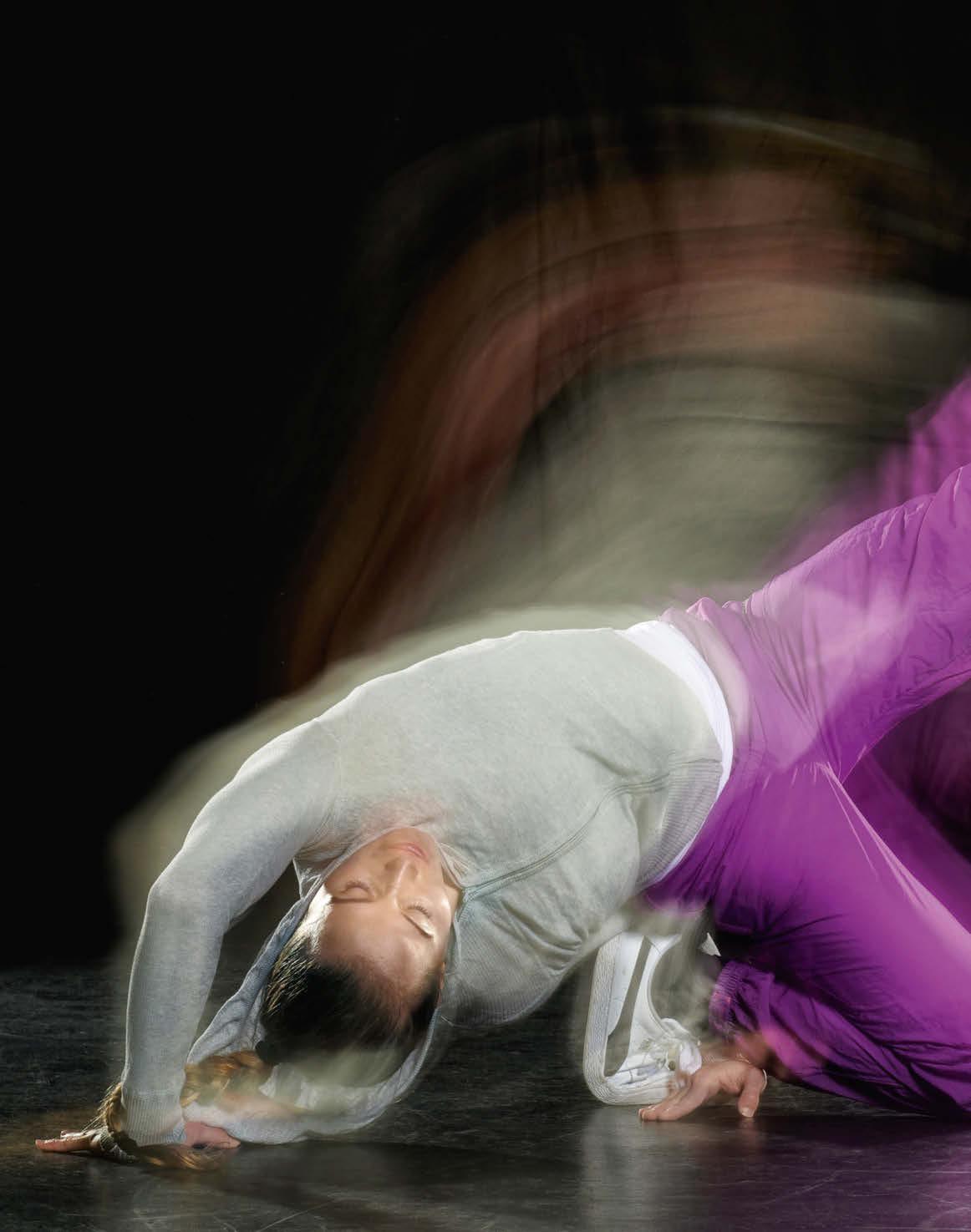
B-Girl Zana
London breaker Roxane Hackwood has more than a decade of international competition experience. Her distinctive style, which incorporates elements of the Brazilian martial art capoeira, won her a place in the final eight at last year’s BC One Cypher UK
route. And I’ve always preferred power moves, but I was influenced away from them by coaches and other breakers who told me they would take too long to master. Now, there’s so much inspiration to draw upon to help you find your own voice, so I can integrate capoeira into my dance, and the flavour of it is coming through. Power will come next. I’ve learned to double down on the things I like.”
Classes such as those offered by Sunni, AJ and Vanessa are bringing new breakers into the fold who might otherwise have missed the opportunity. “Most breakers you meet started out in the scene, but I started with a class at King’s College of all places!” says London-based, Hong Kong-born Natasha Lee, aka B-Girl Nat. “I thought, ‘Why not push myself to do something I’ve never done before?’” After getting hooked on breaking, the adventure-hungry 29-year-old travelled to Taiwan and linked up with B-Boys and B-Girls there, then journeyed on to Australia to do the same. But just as her skills were catching up with her passion, a devastating spinal injury almost stopped her in her tracks. Doctors told her to forget breaking and move on, but, after some recovery time, Nat redoubled her focus on training and came back to the UK stronger and with a newfound fire. Last year she made her UK cypher debut, and she’s now training with UK breaking pioneer and coach DJ Renegade, who has helped set up Breaking GB, an IOC-approved training collective, to support those who are determined to get to the Olympics. That the UK scene is at this point today is testament to these breakers’ ability to evolve.
“It’s important to respect the founders and the work that’s come before us, because we’re building upon that,” says Zana. “But, with breaking, the idea should be that each new generation brings a different flavour to it. If that’s bringing new music, new styles, a new platform, we have to let it evolve. It has to happen in order for [up-and-coming breakers] to feel engaged and form an attachment to it – the new generation doesn’t have a connection to Kool Herc or Grandmaster Flash any more.”
Back in Hackney Wick, Vanessa has completed the last of her three final rounds and watches her phone screen as she catches her breath, awaiting the judges’ decisions. All three vote in her favour. She beams at the camera. “It was totally different to battle online,” she says. “Also, I’d gone one year without battling while I just worked on my breaking, so it was a good comeback. Each round I won just made me more sure of my skills, and by the time I came to the final I knew there was no other option but to win! It’s thanks to the motto I had when not battling last year: ‘You have to be ready so you don’t have to get ready.’”
Sounds like good advice for a scene on the verge of its big break. Watch the B-Girls and B-Boys in battle on the Red Bull BC One YouTube channel; youtube.com







